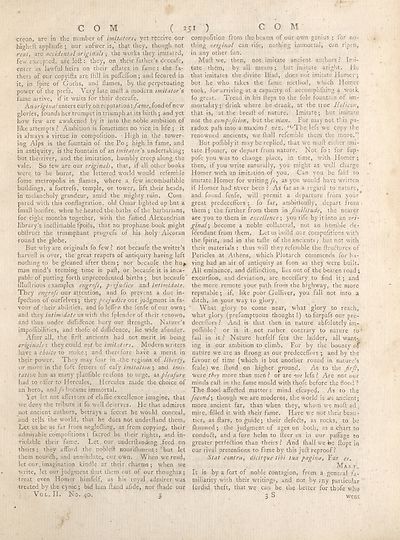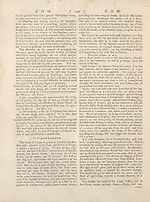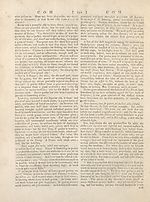Encyclopaedia Britannica; or, A dictionary of arts and sciences, compiled upon a new plan … > Volume 2, C-L
(277) Page 251
Download files
Complete book:
Individual page:
Thumbnail gallery: Grid view | List view

COM ( 2
creon, are in the number of i?nitafors, yet receive our
highelt applaufe ; our anfwer is,' that they, though not
real, are accidental originals ; the works they imitated,
few excepted, are loft: they, on their father’s deceafe,
enter as lawful heirs on their eftates in fame: the fa¬
thers of our copyifts are itill in pofTeffion; and fecured in
it, in fpite of Goths, and flames, by the perpetuating
power of the prefs. Very late muft a modern imitator's
fame arrive, if it waits for their deceafe.
An enters early on reputation: fond of new
glories, founds her trumpet in triumph at its birth ; and yet
how few are awakened by it into the noble ambition of
like attempts ? Ambition is fometimes no vice in life ; it
is always a virtue in compofition. ■ High in the tower¬
ing Alps is the fountain of the Po; high in fame, and
in antiquity, is the fountain of an imitator's undertaking;
but themver, and the imitation, humbly creep along the
vale. So tew are our originals, that, if all other books
were to be burnt, the lettered world would refemble
fome metropolis in flames, where a few incOmbuftible
buildings, a fortrefs, temple, or tower, |ift their heads,
in melancholy grandeur, amid the mighty ruin. Com
pared with this conflagration, old Omar lighted up bat a
fmall bonfire, when he heated the baths of the barbarians,
for eight months together, with the famed Alexandrian
library’s ineftimable fpoils, that no prophane book might
obllruCt the triumphant progrefs of his holy Alcoran
round the globe.
But why are originals fo few ? not becaufe the writer’s
harveft is over, the great reapers of antiquity having left
nothing to be gleaned after them; nor becaufe the hu*
man mind’s teeming time is paft, or becaufe it is inca¬
pable of putting forth unprecedented births; but becaufe'
illuftrious examples engrofs, prejudice and intimidate.
They engrofs our attention, and fo prevent a due in-
fpeftion of ourfelves; they prejudice our judgment in fa¬
vour of their abilities, and fo lelfen the ienfe of opr own;
and they intimidate us with the fplendor of their renown,
and thus under diffidence bury our flrength. Nature’s
impoflibilities, and thofe of diffidence, lie wide afunder.
After all, the firft ancients had not merit in being
originals', they could not be imitutirs. Modern writers
have a cifo/A? to make; and therefore have a merit in
their power. They may foar in -the regions of liberty,
or move in the foft fetters of eafy imitation ; and imi¬
tation has as many plaufible reafons to urge, as pleafure
had to offer to Hercules. Hercules made the choice of
an hero, and fo became immortal.
Yet let not affertors of elaflic excellence imagine, that
we deny the tribute it fo well deierves. He that admires
not ancient authors, betrays a fecret he would conceal,
and tejls the world, that he does not underfland them.
Let us be as far from negle&ing, as from copying, their
admirable edmpofitions: facred be their rights, and in¬
violable their fame. Let, our underftanding feed on
theirs; they afford the nobleft nourifhment: 'but let
them nourifh, and annihilate, our own. When we read,
Jet our. imagination kindle at their, charms ; when we
write, let our judgment fhut them out of our thoughts ;
treat even Homer himfelf, as his rpyal,admirer was
treated by the cynic ; bid him ftand afide, nor fhade our
Vol. II. No. 40. 3
51 ) COM
compofition from the beams of our own genius ; for no¬
thing original can rife, nothing immortal, can rip^.n,
in any other fun.
Mufl: we, then, not imitate ancient authors;? Imi¬
tate them, by all means; but imitate aright. Ho
that imitates the divine Iliad, does not imitate Homer;
but he who takes the fame method, which Homer
took, for arriving at a capacity of accomplifhing a woik
fo great. Tread in his lieps to the foie fountain of im¬
mortality; drink where he drank, at the ttue Helicon,
that is, at the breaft of nature. Imitate; but imitate
not the compojition, but the man. For may not this pa¬
radox pafs into a maxim? viz. “-'The lefs we copy the
renowned ancients, we fhall refemble them the more.”
But pofliblyit maybe replied, that we muft ei.her imi¬
tate Homer, or depart from nature. Not fo : for fup-
pofe you was to change place, in time, with Homer;
then, if you write naturally, you might as well charge
Homer with an imitation of you. Can you be faid to
imitate Homer for writing fo, as you would have written
if Homer hadn'ever been ? As far as a regard to nature,
and found fenfe, will permit a departure from your
great predeceflbrs; fo far, ambitioufly, depart from 1
them ; the farther from them in Jimilitude, the nearer
are you to them in excellence ; you rife by it into an ori¬
ginal ; become a noble collateral, not an humble de-
feendant from them. Let us build our compofitions with
the fpirit, and in the tafle of the ancients; but not with
their materials : thus will they refemble the ftruftures of
Pericles at Athens, which Plutarch commends for ha¬
ving had an air of antiquity as foon as they were built.
All eminence, and diftindlion, lies out of the beaten road;
excurfion, and deviation, are neceffary to fiqd it; and
the more remote your path from the highway, the more
reputable; if, like poor Gulliver, you fall not into a
ditch, in your way to glory.
What glory to come near, what glory to reach,
what glory (prefumptuous thought!) to furpafs our pre¬
deceflbrs ? And is that then in nature abfolutely im-
poflible ? or is it not rather contrary to nature to*
fail in it ? Nature heifelf fets the ladder, all wantv
ing is our ambition to climb. For by the bounty of
nature we are as ftrong as our predeceffors ; and by the
favour of time (which is but another round in nature’s
fcale) we ftand on higher ground. As to the firft,
vtzxe.they more than men ? or are we lefs ? Are not our
minds call: in the fame mould with thofe before the flood ?
The flood affeded matter: mind efcapecj. As to the
fecond\ though we are moderns, the world is a-si ancient;
more ancient far, than when they, whom we moft ad,
mire, filled it with their fame. Have we not their beau¬
ties, as ftars, to guide; their defeds, as rocks, to be
fhunned; the judgment of ages on both, as a chart to
condud, and a fure helm to fteer us in our paffage to
greater perfedion than theirs ? And fltall we fee ftopt in
our rival pretenfions to fame by this juft reproof?
Stat contra, dicitque tibi tua pagina. Fur es.
Mart.
It is by a fort of noble contagion, from a general fa¬
miliarity with their writings, and not by any particular '
fordid theft, that we can be the better for thofe who
3 S went
creon, are in the number of i?nitafors, yet receive our
highelt applaufe ; our anfwer is,' that they, though not
real, are accidental originals ; the works they imitated,
few excepted, are loft: they, on their father’s deceafe,
enter as lawful heirs on their eftates in fame: the fa¬
thers of our copyifts are itill in pofTeffion; and fecured in
it, in fpite of Goths, and flames, by the perpetuating
power of the prefs. Very late muft a modern imitator's
fame arrive, if it waits for their deceafe.
An enters early on reputation: fond of new
glories, founds her trumpet in triumph at its birth ; and yet
how few are awakened by it into the noble ambition of
like attempts ? Ambition is fometimes no vice in life ; it
is always a virtue in compofition. ■ High in the tower¬
ing Alps is the fountain of the Po; high in fame, and
in antiquity, is the fountain of an imitator's undertaking;
but themver, and the imitation, humbly creep along the
vale. So tew are our originals, that, if all other books
were to be burnt, the lettered world would refemble
fome metropolis in flames, where a few incOmbuftible
buildings, a fortrefs, temple, or tower, |ift their heads,
in melancholy grandeur, amid the mighty ruin. Com
pared with this conflagration, old Omar lighted up bat a
fmall bonfire, when he heated the baths of the barbarians,
for eight months together, with the famed Alexandrian
library’s ineftimable fpoils, that no prophane book might
obllruCt the triumphant progrefs of his holy Alcoran
round the globe.
But why are originals fo few ? not becaufe the writer’s
harveft is over, the great reapers of antiquity having left
nothing to be gleaned after them; nor becaufe the hu*
man mind’s teeming time is paft, or becaufe it is inca¬
pable of putting forth unprecedented births; but becaufe'
illuftrious examples engrofs, prejudice and intimidate.
They engrofs our attention, and fo prevent a due in-
fpeftion of ourfelves; they prejudice our judgment in fa¬
vour of their abilities, and fo lelfen the ienfe of opr own;
and they intimidate us with the fplendor of their renown,
and thus under diffidence bury our flrength. Nature’s
impoflibilities, and thofe of diffidence, lie wide afunder.
After all, the firft ancients had not merit in being
originals', they could not be imitutirs. Modern writers
have a cifo/A? to make; and therefore have a merit in
their power. They may foar in -the regions of liberty,
or move in the foft fetters of eafy imitation ; and imi¬
tation has as many plaufible reafons to urge, as pleafure
had to offer to Hercules. Hercules made the choice of
an hero, and fo became immortal.
Yet let not affertors of elaflic excellence imagine, that
we deny the tribute it fo well deierves. He that admires
not ancient authors, betrays a fecret he would conceal,
and tejls the world, that he does not underfland them.
Let us be as far from negle&ing, as from copying, their
admirable edmpofitions: facred be their rights, and in¬
violable their fame. Let, our underftanding feed on
theirs; they afford the nobleft nourifhment: 'but let
them nourifh, and annihilate, our own. When we read,
Jet our. imagination kindle at their, charms ; when we
write, let our judgment fhut them out of our thoughts ;
treat even Homer himfelf, as his rpyal,admirer was
treated by the cynic ; bid him ftand afide, nor fhade our
Vol. II. No. 40. 3
51 ) COM
compofition from the beams of our own genius ; for no¬
thing original can rife, nothing immortal, can rip^.n,
in any other fun.
Mufl: we, then, not imitate ancient authors;? Imi¬
tate them, by all means; but imitate aright. Ho
that imitates the divine Iliad, does not imitate Homer;
but he who takes the fame method, which Homer
took, for arriving at a capacity of accomplifhing a woik
fo great. Tread in his lieps to the foie fountain of im¬
mortality; drink where he drank, at the ttue Helicon,
that is, at the breaft of nature. Imitate; but imitate
not the compojition, but the man. For may not this pa¬
radox pafs into a maxim? viz. “-'The lefs we copy the
renowned ancients, we fhall refemble them the more.”
But pofliblyit maybe replied, that we muft ei.her imi¬
tate Homer, or depart from nature. Not fo : for fup-
pofe you was to change place, in time, with Homer;
then, if you write naturally, you might as well charge
Homer with an imitation of you. Can you be faid to
imitate Homer for writing fo, as you would have written
if Homer hadn'ever been ? As far as a regard to nature,
and found fenfe, will permit a departure from your
great predeceflbrs; fo far, ambitioufly, depart from 1
them ; the farther from them in Jimilitude, the nearer
are you to them in excellence ; you rife by it into an ori¬
ginal ; become a noble collateral, not an humble de-
feendant from them. Let us build our compofitions with
the fpirit, and in the tafle of the ancients; but not with
their materials : thus will they refemble the ftruftures of
Pericles at Athens, which Plutarch commends for ha¬
ving had an air of antiquity as foon as they were built.
All eminence, and diftindlion, lies out of the beaten road;
excurfion, and deviation, are neceffary to fiqd it; and
the more remote your path from the highway, the more
reputable; if, like poor Gulliver, you fall not into a
ditch, in your way to glory.
What glory to come near, what glory to reach,
what glory (prefumptuous thought!) to furpafs our pre¬
deceflbrs ? And is that then in nature abfolutely im-
poflible ? or is it not rather contrary to nature to*
fail in it ? Nature heifelf fets the ladder, all wantv
ing is our ambition to climb. For by the bounty of
nature we are as ftrong as our predeceffors ; and by the
favour of time (which is but another round in nature’s
fcale) we ftand on higher ground. As to the firft,
vtzxe.they more than men ? or are we lefs ? Are not our
minds call: in the fame mould with thofe before the flood ?
The flood affeded matter: mind efcapecj. As to the
fecond\ though we are moderns, the world is a-si ancient;
more ancient far, than when they, whom we moft ad,
mire, filled it with their fame. Have we not their beau¬
ties, as ftars, to guide; their defeds, as rocks, to be
fhunned; the judgment of ages on both, as a chart to
condud, and a fure helm to fteer us in our paffage to
greater perfedion than theirs ? And fltall we fee ftopt in
our rival pretenfions to fame by this juft reproof?
Stat contra, dicitque tibi tua pagina. Fur es.
Mart.
It is by a fort of noble contagion, from a general fa¬
miliarity with their writings, and not by any particular '
fordid theft, that we can be the better for thofe who
3 S went
Set display mode to:
![]() Universal Viewer |
Universal Viewer | ![]() Mirador |
Large image | Transcription
Mirador |
Large image | Transcription
Images and transcriptions on this page, including medium image downloads, may be used under the Creative Commons Attribution 4.0 International Licence unless otherwise stated. ![]()
| Encyclopaedia Britannica > Encyclopaedia Britannica; or, A dictionary of arts and sciences, compiled upon a new plan … > Volume 2, C-L > (277) Page 251 |
|---|
| Permanent URL | https://digital.nls.uk/144916948 |
|---|
| Attribution and copyright: |
|
|---|
| Description | Ten editions of 'Encyclopaedia Britannica', issued from 1768-1903, in 231 volumes. Originally issued in 100 weekly parts (3 volumes) between 1768 and 1771 by publishers: Colin Macfarquhar and Andrew Bell (Edinburgh); editor: William Smellie: engraver: Andrew Bell. Expanded editions in the 19th century featured more volumes and contributions from leading experts in their fields. Managed and published in Edinburgh up to the 9th edition (25 volumes, from 1875-1889); the 10th edition (1902-1903) re-issued the 9th edition, with 11 supplementary volumes. |
|---|---|
| Additional NLS resources: |
|

